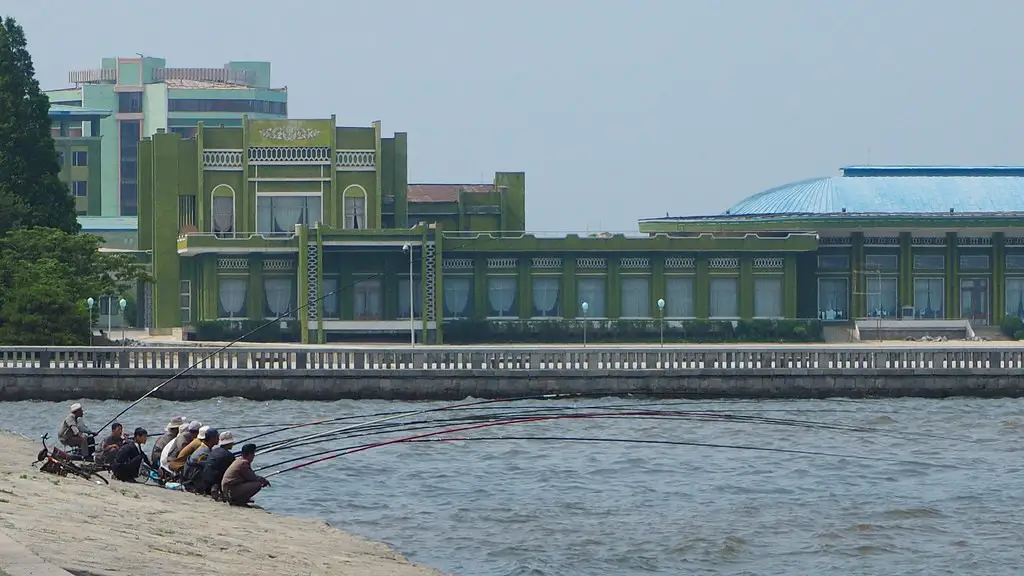Lack of Money and Outside Support
In most cases, leaving North Korea is incredibly difficult due to a lack of money and outside support. While it is possible to make the journey to China, this is a perilous and expensive route. Many individuals will not be able to afford the necessary financial resources to make such a journey. Moreover, individuals often require assistance from other countries or organizations in order to move to another nation. The Democratic People’s Republic of Korea (DPRK) is notorious for its restrictive policies on travel, leaving many individuals without this assistance.
Additionally, the DPRK controls various aspects of residency. Individuals must in many ways obtain the state’s approval to move and live in another country. Travel documents such as visas or a valid passport are not easy to come by, making the process of travelling abroad difficult. In fact, many North Koreans who manage to escape the country will not have valid travel documents, making them vulnerable to arrest along their journey.
Risks Associated With Leaving North Korea
Beyond the associated costs, individuals must also take into consideration the risks that come with leaving North Korea. It is highly illegal to leave the country without the permission of the state, resulting in severe punishment for those who do. Not only is there a possibility of death, but individuals must also be aware of the risk of kidnapping, torture and detention upon leaving the country. Moreover, if caught in an escape attempt, there is a high chance that the individuals involved will be coerced into returning to North Korea.
In addition, the journey itself is dangerous. Many individuals will risk their lives in order to cross the border and make it to safety. This involves dangerous river crossings and even more dangerous encounters with the North Korean military. Many of those attempting to flee are captured and sent back to their country of origin, or worse, killed.
The Pull of Family Ties
For North Koreans, family ties play an immense role in the decision making process. Most North Koreans are extremely close with their families, making the decision to abandon them difficult, or even impossible. Knowing the risk of being caught and returning to North Korea, or never being able to see their family again, can be extremely daunting and a major deterrent from attempting to escape from the country.
Societal Pressures
The North Korean government does its best to dissuade its citizens from leaving the country. Not only does it punish those who attempt to do so, but it also perpetuates a cultural environment in which patriotism and nationalism are prized values. The government has been known to promote the idea of self-sacrifice and devotion to the nation, while vilifying those who try to escape. In doing so, it creates an environment in which individuals are ashamed of trying to flee, making the decision to do so even more difficult.
International Sanctions
The sanctions imposed on the DPRK by the international community make it difficult for individuals to leave North Korea. Without access to foreign money, resources, and humanitarian aid, it is much more difficult for individuals to obtain the resources necessary to make it outside the country.
Moreover, it has been difficult to monitor the actions taken against individuals by the North Korean government, making it hard to ensure that individuals attempting to leave the country are able to do so in safety. International observers have been largely unable to get into the country in order to assess the situation and make suitable recommendations.
Strict Governance Policies
Government policies such as the songbun system make it difficult for individuals to traverse the country. Those with a low-songbun status will not be allowed to travel. Government restrictions can also make it difficult for individuals to plan their escape. Since North Korean citizens are not allowed access to maps or other materials, it can be difficult to know the best route to safety.
Meanwhile, phone calls and emails from outside the country are heavily monitored and censored. This makes it difficult for individuals to determine the best way to make their escape, or even stay connected with those outside the country.
Limited Cultural Exchange
Finally, the limited cultural exchange between North Korea and the rest of the world makes it difficult for individuals to leave the country. North Koreans have limited access to foreign media, which constrains the amount of information they have on other countries. This prevents individuals from accurately assessing their options, and what it would be like to live in a different country. In many ways, this limits their ability to make an informed choice and may leave them feeling hopeless and unable to contemplate such a difficult journey.
Fear of the Unknown
Another major reason why it is hard to leave North Korea is the fear of the unknown. North Korean citizens often lack an understanding of the outside world, making the thought of fleeing to another nation an incredibly daunting undertaking. Visions of a magical foreign land are often replaced with fears of the potential unknowns. This fear can prevent individuals from making the necessary steps to leave their home country, leaving them feeling helpless and unable to decide.
An Uncertain Future Upon Arrival
Finally, North Koreans are naturally anxious about the future that awaits them upon arrival. In many cases, these individuals have nothing to their name and have limited experience in countries other than their own. This could leave them feeling uncertain about what their future holds, and make them less likely to take the risks associated with leaving North Korea in the first place.


